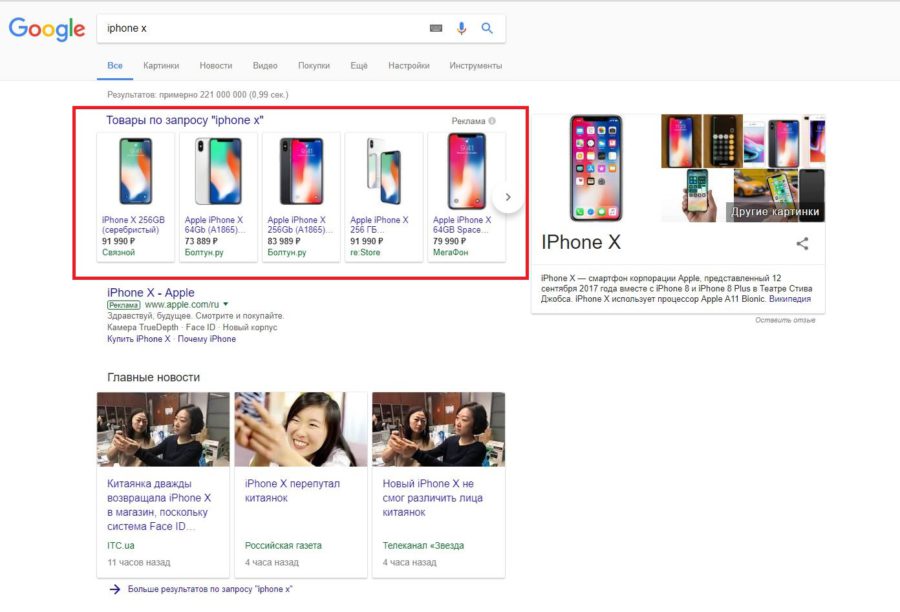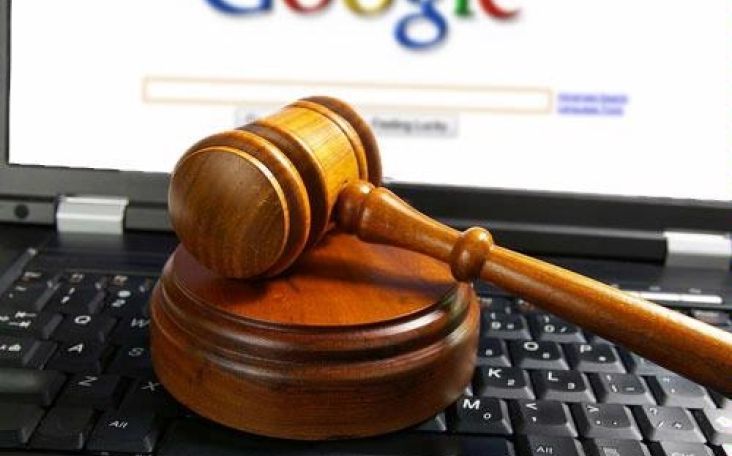This summer, the European Commission (hereinafter – EC) fined Google 2.42 billion euros. The reason was illegal, according to the EC, Google's actions related to the Google Shopping service (Google Shopping). According to the EC, Google illegally underestimated the sites of commodity aggregators (European e-katalog or price.ru) in the results for requests not directly related to them. For example, if a user searched for “iPhone X”, he was given a site Apple, online store sites, smartphone reviews, news about it, but not product aggregators. As a result, according to the EC, the Google Shopping service received an illegal advantage over competitors.

Actually, here. Integration of Google Shopping instead of standard advertising links, according to the EC, makes product aggregators unnecessary
I read the news on this topic with great interest. True, the more I read, the more I realized that each next read material does not give me any new information. All the materials of the Russian-language media are as if copied from each other: the fact of claims is reported, the EC press release is briefly retold and it is mentioned that Google does not agree with the accusations. Not a single media outlet wanted to delve into the topic. After reading about a dozen Russian-language articles, I have not come one iota to understand what is happening in general. I think, like the vast majority of people.
● Will any site, whose functionality coincides with one of the Google products, now be able to demand an increase in the search results from the company?
● By what criteria does the EC determine that there is a deliberate underreporting? After all, a low position in the search does not equal artificial underestimation.
● Where is the line between the natural synergy of the company's products and anti-competitive actions?
● How does Google argue its position? And how does the EC refute the arguments?
In general, there were a lot of questions, the topic is very interesting, and Russian journalism is in good shape (degraded). Everybody wrote about this case. But nobody tried to figure it out.
This material was born by accident, thanks to the popular Russian-language techno podcast, the hosts of which undertook to speculate about this case. Podcast is a very detailed genre, and I was really looking forward to a detailed analysis of the situation, disputes, discussions. I was looking forward to how one presenter would undertake to defend the position of the EC, the other – the position of Google, how they would take apart the arguments of both sides. But! The guys disappointed me: a story about the fact of making claims, a brief retelling of the news and a short monologue about the benefits of antitrust laws (angry smiley). Then I could not resist and began to google myself in order to understand the legal positions of both parties. And then he wrote a big letter to the guys, where he described in detail what the essence and the matter of this case is and what it means to reveal the topic. To my surprise, in the next issue they read my letter almost word for word and admitted that they had covered the topic very superficially. And I realized that this would make a great article (it's a pity there is a big temporary difference between 'understand' and 'do' :))

Below are five points that you need to know and understand in order to make a balanced and competent judgment about what happened.
1. The EC is a supervisory body of executive power, like our RosHrenNadzors (com, consumer, agricultural, those, fish, etc.). The EC decision cannot be spoken of as the ultimate truth. This is just the opinion of officials from the EC. Only the court will decide whether the fine was fair or not. This is a fundamental point, because, unlike the court, which is ideally independent and impartial, EC officials are appointed and removed depending on how satisfied the governments of key EU countries are with their work. Thus, the previous European Commissioner for Competition Joaquin Almunia entered into an amicable agreement with Google in the case of the allocation of links to its services and planned to conclude in the case related to Google Books, since did not see judicial prospects, but this decision was not approved by France and Germany. After that, he was removed and replaced by the current European Commissioner Margrethe Vestager, who in one of her first interviews stated that she would fight harder and more decisively against the “monopoly” of American companies in the European market. And soon she opened several new proceedings against Alphabet, one of which has already been completed with a fine. The rest are still coming.
2. Google Shopping is not a product aggregator, it does not index products in online stores. Google Shopping is an add-on functionality of the Google AdWords advertising network. Previously, companies placed advertisements in the form of advertising links, but now these are product cards. Google Shopping does not index the pages of online stores, it only offers paid advertising placements, which is honestly communicated to the user in a prominent place.
The fact that Shopping is not a product aggregator is very important. It is a big question whether the “paid classifieds board” is a direct competitor to the product aggregators that index the pages of online stores. Although it is obvious that the intersection of the utility function is present for the user.
3. The essence of the EC's claim is that European Internet services were not high enough in Google's ranking in comparison to prices. And here the most interesting thing begins: the ranking of sites in the SERP is based on the Google algorithm evaluating the value of a site for a user for a specific request. Google sets the search algorithm based on its vision of user needs. And if Google believes that, upon request 'Nike new balance', the pages of this product in the most popular online stores, reviews and reviews, description pages on the manufacturer's official website will be useful to the user, then Google has every right to put these sites higher in SERP, and product aggregators are not considered relevant and therefore place them at the bottom of the SERP. And if it so happened that Google is mistaken with its vision of user preferences and in fact they need product aggregators high in the search results, then this only means that Google search as a product is not good enough.
And the EC cannot do anything about it, it has no right to regulate the quality of a private company's product (requirements for the quality and safety of products can be established at the level of legislation, but not at the level of decisions of the antimonopoly authority). The regulator cannot regulate the sweetness of Nestle ice cream, the smartness of the Google algorithm, and the beauty of the new iPhone. If specific requirements for a product are not established at the level of laws, then any shortcomings in the product remain a private matter of the manufacturer and consumers.
4. And then the controversial actions of the EC begin, which are now challenged by Google in the EU court: the EC recognized Google Shopping not as an additional function of the advertising network, but as a commodity aggregator that competes with other commodity aggregators. The EC accuses Google of setting low priority for product aggregators in the search algorithm, not because Google considers them irrelevant for a specific product query, but maliciously in order to promote its own 'product aggregator'. This is no longer a question of search quality, but a question of anti-competitive behavior.
The court will sequentially consider three main issues. Is it correct to view the ad board as a competitor to product aggregators? If so, is low priority for product aggregators really based on real user preferences? If not, is Google really a monopoly in the market in question?
5. The last question is the most important. The fact that Google occupies 90% of the Internet search market does not mean anything at all in this case. The fact that 90% of people, when looking for cat photos or leaked photos of celebrities, do it through Google does not in any way make Google a monopolist, for example, in the hotel search market. Most people search for hotels not through Google, but through Booking.com, search for taxis through Uber, search for restaurants through Yelp, etc. When it comes to product search, there are numerous studies that say Google has lost hopelessly in this market. The vast majority of people (60-75%) when looking for a product, search for it immediately on Amazon, EBay or other sites, and only 25% are looking for products in Google.
In court, Google has a good chance to prove that the terrible picture with “a monopolist that occupies 90% of the Internet search market” in this case is absolutely out of the box, only 25% of people are looking for products in Google.

Such illustrations to the news mislead people. No court decision has been made yet
As you can see, the trial will be long-term and interesting. Most likely, the EC will be able to prove in court that Google Shopping is a full-fledged competitor of European product aggregators. It will be more difficult to prove that their low ranking position does not correspond to the objective needs of users. In Europe, people value convenience much more than insignificant savings, therefore, they go straight to the usual Amazon, which will deliver guaranteed quickly and at a convenient time. Showing at the top of a product page listing in a user's favorite online stores may indeed be more justifiable than showing price comparison services. But even if Google still fails to convince the court at this stage, the company still has a chance to prove that “anti-competitive” actions affected only 25% of users, which means that the market share was not monopoly.
The EC decision is very ambiguous, and there are certain questions about the validity of the charges.
What do you think of all this now?
P.S. In all fairness, the EC is not our FAS. The EC's Google Shopping investigation has been going on for over seven years. Such a long period is not accidental, there is something to understand. And compare this with the reactive FAS, which spent 7 months on the entire proceedings on Android.
